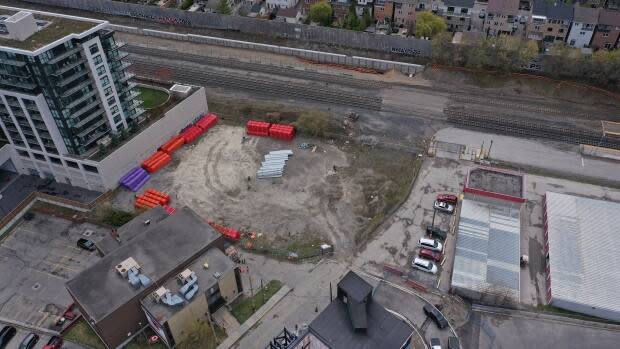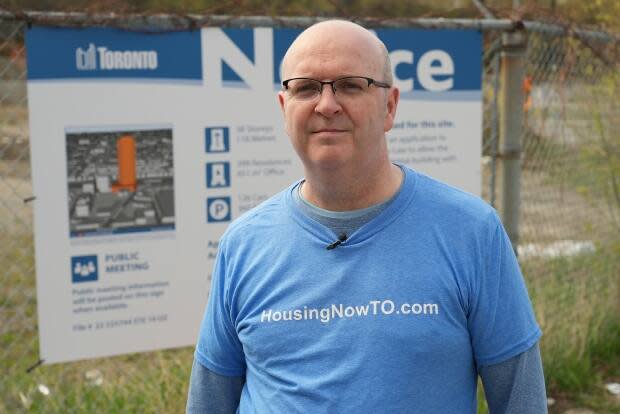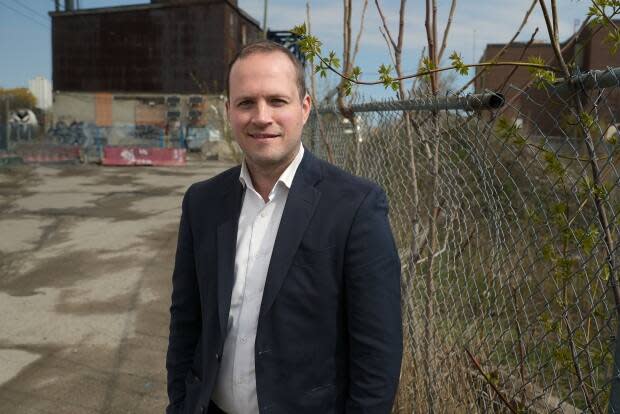Metrolinx land sold to developers must include affordable housing, advocates say

Pirawin Namasivayam lives in the basement of his parents' Scarborough bungalow because finding an apartment in Toronto's east end has proven unaffordable for the 21-year-old.
Namasivayam, a student at the University of Toronto, says he and some of the peers are now considering moving west to Alberta or the Prairies after graduation simply to afford housing.
He says more affordable housing in the city's east end would deter him from thoughts of a life far from home.
"I think a lot of people have kind of given up on living in Toronto," said Namasivayam. "You're going to be stuck living with your parents for the next 10, 20 years, trying to scrounge up enough money."
Namasivayam, who started volunteering with the advocacy group More Neighbours Toronto during the pandemic, says the surplus provincial land that Metrolinx has been selling to developers could be a great way to create more affordable housing.
The problem? The government isn't attaching any requirements to build more affordable housing to the land that the transit agency is selling off. And that leaves delopers free to charge whatever they like for the units they build.

One such piece of land is 8 Dawes Rd., which was recently sold by Metrolinx to a developer. Steps from the Danforth GO train station and Main subway station, it's an accessible location, yet the deal contained no requirements for affordable housing units — and advocates are calling that a big missed opportunity.
"It's a poor decision," said Namasivayam.
When land is near transit hubs, it's even more critical that some units are affordable, he says, adding many on more modest incomes don't own cars.
'Province needs to do better'
Mark Richardson, a volunteer with the group HousingNowTO, says the Dawes Road location was the only site available for development in the area near the Danforth GO station that was government-owned.
"The province needs to do better," said Richardson. "If you want affordable housing development, don't waste your land and do deals like this that don't have affordable housing baked into them."
He is concerned this could keep happening, especially as Metrolinx — a Crown agency of the government of Ontario — sells or leases more land to developers as the Ontario Line is being built.
"Metrolinx has tons of land. And when they dispose of their land, they put zero affordable housing requirements," said Richardson.
Metrolinx did not provide a response in time for publication.

He says the City of Toronto has created better affordable housing standards on some of its land over the last few years, with requirements for at least 20 to 30 per cent of units to be affordable rental units.
Dakota Brasier, the press secretary for Minister of Transportation Caroline Mulroney, did not directly respond to concerns that the government was not doing enough to build affordable housing.
Braiser said in a statement that Metrolinx first offers the land to "a list of public institutions including municipalities, school boards, post-secondary institutions, not-for-profit corporations and Indigenous groups. If there is no interest from these groups, Metrolinx then lists the property to be publicly sold at fair market value."
"This transparent, and publicly available process ensures that taxpayer dollars are respected while disposing of surplus properties," she added.
'This is not complicated,' says MP
Politicians representing the Beaches-East York riding say a model already exists at other levels of government that should be universally followed.
"This is not complicated," said Nate Erskine-Smith, the MP for the riding. "[With] the city and the federal government public lands that are sold off, there's a percentage committed to affordability. Metrolinx could and should have done the same thing."
He says that figure should be at least 20 percent, regardless of which level of government owned the land involved.

"People all across this province, especially here in the GTA, are desperately in need of affordable housing," he said. "If [the provincial government] cared about affordable housing, this deal wouldn't have gone through."
The riding's MPP, Mary-Margaret McMahon, says all levels of government should be working together to "address the affordability crisis".
She also says developers who purchase land from the province should face similar requirements as they do from the city to commit to affordable housing.
City to explore affordability options during review
Marlin Spring Developments, the company that purchased the land, is still going through the development process at the city.
Christine Ono, a project manager in Toronto's city planning department says the city will explore opportunities for affordable housing through the application review process.
But "the city cannot currently require affordable housing to be provided on this site through the planning approvals," she said. "Securing any amount of affordable housing would require cooperation with the applicant."
Pedro Spring, CEO of Marlin Spring Developments, says the company "had success voluntarily integrating affordable housing into a number of our projects recently." He says the company has also worked well with the city and local affordable housing providers in the past.
Spring says the company will "continue to work with all stakeholders to identify the community priorities and integrate them into the development."
Richardson says he's hopeful the developer will agree to make some units affordable, but feels it's unlikely most developers would agree to a figure as high as 20 per cent if it wasn't a requirement.
"It shouldn't be left up to the goodwill of a developer," he said.


